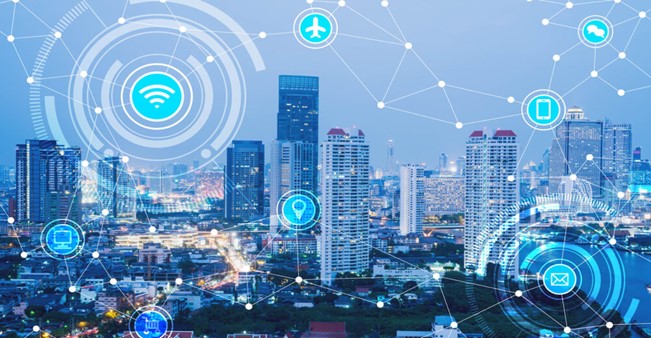Future of Smart Cities & IoT

Smart cities, enabled by the Internet of Things (IoT), are rapidly becoming a reality and are expected to transform how people live, work, and interact with their environment. In the future, smart cities will likely become even more connected, with a larger number of sensors and devices communicating with each other to create a seamless and integrated experience for citizens. Overall, the future of smart cities and IoT is promising and holds the potential to improve the quality of life for citizens significantly.
What Is a Smart City?
A smart city is a city with a high level of connectivity, computing, and data processing. This connectivity may be physical, meaning that various devices are connected to the internet or each other, or virtual, meaning that it exists in a virtual space, such as online communities.
As a concept, anything made smart acts and works more efficiently and effectively. A smart city has been conceptualized to use various technologies like the internet of things, Machine-to-machine (M2M), artificial intelligence, big data, and embedded technologies, along with voice activation, sensors, and other electronic devices to collect data.
To put it in simpler terms, a smart city uses sensor-based data collection along with powerful analytics to automate a wide range of tasks and services, helping in lowering costs, optimizing resource usage, and lowering the impact on the environment, hence leading toward sustainable development.
The 3 Layers of A Smart City
A smart city consists of the following three layers:
- First layer - Technology based:
This includes sensors and smartphones connected via a high-speed communication network. - Second layer - Application based:
Here, applications are used to convert raw data into useful insights, create alerts and take action with tools created by app developers and technology providers. - Third layer - City-usage based:
This is the level where the technology is absorbed and used by companies and people at a city level or higher.
Future of Smart Cities with IoT
Some cities are already advancing the way ahead in the direction of becoming smart cities. For instance, in the city of Singapore where the government planned to implement energy-efficient and intelligent lighting for all public roads and solar panel installation of solar panels for over 6,000 buildings by 2022. Alongside, for new building site designs, engineers were appointed to analyze the wind flow, solar penetration, and shaded areas for better construction and usage of a sustainable energy model.
Another successful story of a smart city is Dubai. As of 2021, the plan was to digitize all government services, including over 100 initiatives, from transportation, infrastructure, and electricity to economic services and service planning. The city has already achieved digitizing almost 90 services, and this can be accessed through the DubaiNow app.
With the use of AI monitoring systems for drivers, accidents have been reduced to a great extent. They also have autonomous police stations, where the city folks can pay fines and report incidents without talking to the police in charge.
Along with the two examples mentioned above, Oslo, Copenhagen, Boston, Amsterdam, New York, London, Barcelona, and Hong Kong are other cities that have advanced their way to becoming smart cities in the near future.
In a recent study, it is anticipated that the global IoT trends in the smart cities market will grow significantly from a valuation of USD 130.6B in 2021 to USD 312.2B by 2026. There are a lot more studies that have been conducted and will be conducted, and all will point towards one aim, which is the bright future of smart cities becoming smarter with IoT.
Position of IoT in Smart Cities of India
In 2016, the Government of India began the Smart Cities Mission of 100 smart cities, which is expected to complete by 2024. The state government has utilized over Rs. 4.5 lakh crores in the pipeline and Rs. 2 lakh crores in smart cities projects. Right from traffic management to energy harvesting by the use of solar panels and LEDs on streetlights to smart meters for water, multiple IoT applications are already deployed on these smart city projects.
An integral part of the IoT implementation is cloud computing service, which is offered by various companies in India, which also resulted in cost reduction for the smart solutions in smart cities like Indore, Pune, Ahmedabad, Coimbatore, and Kochi.
Data analysis and network and data security are other critical aspects of IoT implementation. 5G network deployment in India has increased the implementation of IoT. 5G connectivity, hand-in-hand with IoT, will have a major impact on home automation, security, and various other industries. As of the end of 2022, the Indian government planned 5G deployment in many cities, as it has been deployed in countries like Korea, America, and Japan.
Offerings of Smart Cities
With the increase in overall world population, slow and steady, the resources are attaining scarcity. With IoT-like technologies to implement smart cities, tackling issues in a coexisting society becomes easier.
The major offerings of smart cities are:
- Improved quality of life
- Better public safety
- Better health systems
- Sustainable environment
- Easier management of traffic
- Economic development
- Better energy, water, and waste management
Allied Digital’s Expertise in Smart Cities
Allied Digital has already worked in implementing IoT solutions and making Aurangabad, Bidkin, and Kalyan-Dombivali Municipal smart cities. We have deployed over 100,000 sensors and contributed to 30%+ savings. We are early adopters of new technology and hold expertise as Master System Integrators in smart cities. In 2017, we were awarded the Good for India-Digital innovation in Smart City Solutions, an important aspect of smart city implementation. We also believe in and like to keep transparency and visibility in all our operations. Reach out to us and allow us to serve you with the best state-of-art-technology.



